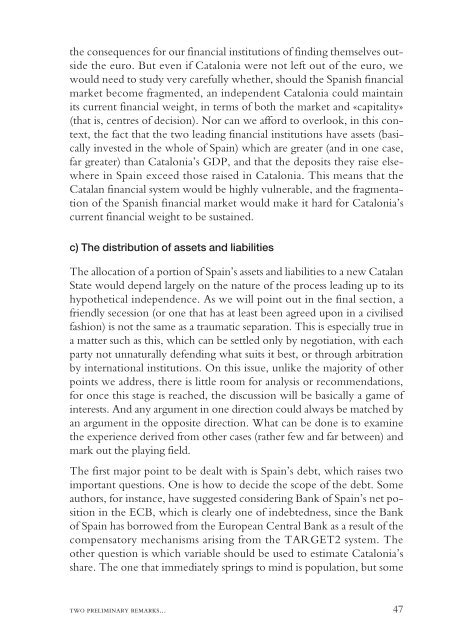The Economy of Catalonia
the_economy_of_catalonia._questions_and_answers_on_the_economic_impact_of_independence
the_economy_of_catalonia._questions_and_answers_on_the_economic_impact_of_independence
You also want an ePaper? Increase the reach of your titles
YUMPU automatically turns print PDFs into web optimized ePapers that Google loves.
the consequences for our financial institutions <strong>of</strong> finding themselves outside<br />
the euro. But even if <strong>Catalonia</strong> were not left out <strong>of</strong> the euro, we<br />
would need to study very carefully whether, should the Spanish financial<br />
market become fragmented, an independent <strong>Catalonia</strong> could maintain<br />
its current financial weight, in terms <strong>of</strong> both the market and «capitality»<br />
(that is, centres <strong>of</strong> decision). Nor can we afford to overlook, in this context,<br />
the fact that the two leading financial institutions have assets (basically<br />
invested in the whole <strong>of</strong> Spain) which are greater (and in one case,<br />
far greater) than <strong>Catalonia</strong>’s GDP, and that the deposits they raise elsewhere<br />
in Spain exceed those raised in <strong>Catalonia</strong>. This means that the<br />
Catalan financial system would be highly vulnerable, and the fragmentation<br />
<strong>of</strong> the Spanish financial market would make it hard for <strong>Catalonia</strong>’s<br />
current financial weight to be sustained.<br />
c) <strong>The</strong> distribution <strong>of</strong> assets and liabilities<br />
<strong>The</strong> allocation <strong>of</strong> a portion <strong>of</strong> Spain’s assets and liabilities to a new Catalan<br />
State would depend largely on the nature <strong>of</strong> the process leading up to its<br />
hypothetical independence. As we will point out in the final section, a<br />
friendly secession (or one that has at least been agreed upon in a civilised<br />
fashion) is not the same as a traumatic separation. This is especially true in<br />
a matter such as this, which can be settled only by negotiation, with each<br />
party not unnaturally defending what suits it best, or through arbitration<br />
by international institutions. On this issue, unlike the majority <strong>of</strong> other<br />
points we address, there is little room for analysis or recommendations,<br />
for once this stage is reached, the discussion will be basically a game <strong>of</strong><br />
interests. And any argument in one direction could always be matched by<br />
an argument in the opposite direction. What can be done is to examine<br />
the experience derived from other cases (rather few and far between) and<br />
mark out the playing field.<br />
<strong>The</strong> first major point to be dealt with is Spain’s debt, which raises two<br />
important questions. One is how to decide the scope <strong>of</strong> the debt. Some<br />
authors, for instance, have suggested considering Bank <strong>of</strong> Spain’s net position<br />
in the ECB, which is clearly one <strong>of</strong> indebtedness, since the Bank<br />
<strong>of</strong> Spain has borrowed from the European Central Bank as a result <strong>of</strong> the<br />
compensatory mechanisms arising from the TARGET2 system. <strong>The</strong><br />
other question is which variable should be used to estimate <strong>Catalonia</strong>’s<br />
share. <strong>The</strong> one that immediately springs to mind is population, but some<br />
two preliminary remarks... 47


